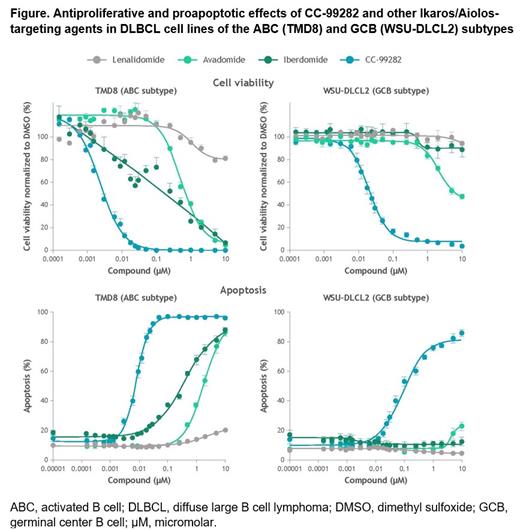Abstract
CC-99282 is a novel, oral CELMoD ® agent currently under investigation in phase 1 clinical studies in patients with relapsed or refractory (R/R) non-Hodgkin lymphomas (NHL) and chronic lymphocytic leukemia (CLL)/small lymphocytic lymphoma (SLL). Mechanistically, CC-99282 interacts with the CRL4 CRBN E3 ubiquitin ligase substrate receptor CRBN to induce recruitment and ubiquitin-mediated proteasomal degradation of transcription factors Ikaros and Aiolos. The design intent for CC-99282 included efficient absorption, deep tissue distribution, and prolonged exposure to optimize activity in bulky lymphoma lesions. Recently, we reported that CC-99282 shows potent antitumor activity in different preclinical models of diffuse large B cell lymphoma (DLBCL; Lopez-Girona, et al. Hematol Oncol. 2021). Here, we provide an expanded analysis of CC-99282 activity as a monotherapy, as well as examine its synergistic activity with anti-CD20 antibody treatment, in preclinical models of NHL including DLBCL and follicular lymphoma (FL).
Compared with existing agents targeting Ikaros/Aiolos that show activity in hematologic malignancies, such as lenalidomide, avadomide, and iberdomide (CC-220), CC-99282 induced a more rapid, deep, and sustained degradation of Ikaros/Aiolos, causing derepression of cyclin-dependent kinase (CDK) inhibitors and interferon-stimulated genes (IRF7, IFIT3, and DDX58), and the reduction of the highly critical oncogenic factors c-Myc and IRF4. These molecular changes were followed by potent, 10- to 100-fold enhanced, autonomous cell killing and induction of apoptosis (Figure). Our results show that these effects were independent of the cell of origin (activated B cell [ABC; TMD8 cell line], germinal center B cell [GCB; WSU-DLCL2 cell line], or primary mediastinal B cell lymphoma [PMBL] subtypes of DLBCL) or presence of high-risk chromosomal translocations (MYC, BCL2, and/or BCL6), as observed in a panel of 36 lymphoma cell lines that included DLBCL and FL cell lines. In vivo, CC-99282 demonstrated robust tissue distribution that favored target tissues and exhibited antitumor activity resulting in improved tumor regression and tumor-free animals in several lymphoma xenograft models, including an intracranial xenograft model. This strong antitumor activity was observed using various continuous and intermittent dosing paradigms.
The potent, direct autonomous cell-killing activity of CC-99282 was augmented when CC-99282 was combined with the anti-CD20 antibody rituximab. In vitro combination studies of CC-99282 with rituximab in lymphoma cell lines demonstrated enhanced cell killing by human natural killer (NK) cells, macrophage-mediated phagocytosis, antibody-dependent cellular cytotoxicity (ADCC), and antibody-dependent cellular phagocytosis (ADCP). In FL and DLBCL cell lines, we showed that the combination of CC-99282 with rituximab resulted in increases in both NK-mediated ADCC and macrophage-mediated ADCP of up to 20% compared with rituximab treatment alone. In vivo, combination treatment with CC-99282 and rituximab induced dose-dependent tumor growth inhibition in WSU-DLCL2 and RL (FL) xenograft models. In the WSU-DLCL2 model, CC-99282 (1 mg/kg) or rituximab (10 mg/kg) monotherapy resulted in modest tumor growth inhibition, whereas the combination of CC-99282 (1 mg/kg) and rituximab (10 mg/kg) resulted in tumor regression in 100% of animals. Similar results were obtained in FL xenograft models using the RL cell line, where combinations of CC-99282 (1 mg/kg) with rituximab (25 mg/kg) induced complete tumor regression in 100% of animals.
In conclusion, CC-99282 is a novel CELMoD agent with an improved substrate degradation profile compared with existing Ikaros/Aiolos-degrading agents. CC-99282 demonstrated enhanced antiproliferative and apoptotic activities across a broad range of lymphoma cells and a robust distribution profile that favors target tissues such as lymphoid organs. In addition, CC-99282 acts synergistically in combination with anti-CD20 monoclonal antibody treatment. Collectively, these data support the clinical investigation of CC-99282 as monotherapy and in combination with rituximab in patients with R/R NHL.
Carrancio: Bristol Myers Squibb: Current Employment, Current equity holder in publicly-traded company. Groocock: Bristol Myers Squibb: Current Employment, Current equity holder in publicly-traded company. Janardhanan: Bristol Myers Squibb: Current Employment, Current equity holder in publicly-traded company. Jankeel: Bristol Myers Squibb: Current Employment, Current equity holder in publicly-traded company. Galasso: Ryan Galasso: Current Employment, Current equity holder in publicly-traded company. Guarinos: Bristol Myers Squibb: Current Employment. Narla: Bristol Myers Squibb: Current Employment. Groza: Bristol Myers Squibb: Current Employment. Leisten: Bristol Myers Squibb: Current Employment, Current equity holder in publicly-traded company. Pierce: Bristol Myers Squibb: Current Employment, Current equity holder in publicly-traded company. Rolfe: Bristol Myers Squibb: Current Employment, Current equity holder in publicly-traded company. Lopez-Girona: Bristol Myers Squibb: Current Employment, Current equity holder in publicly-traded company.


